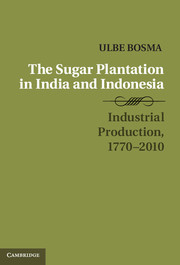L’édition demandée n’est plus disponible, nous vous proposons la dernière édition.
The Sugar Plantation in India and Indonesia Industrial Production, 1770–2010 Studies in Comparative World History Series
Langue : Anglais
Auteur : Bosma Ulbe

Ulbe Bosma details how the British and Dutch introduced the sugar plantation model in Asia and refashioned it over time.
European markets almost exclusively relied on Caribbean sugar produced by slave labor until abolitionist campaigns began around 1800. Thereafter, importing Asian sugar and transferring plantation production to Asia became a serious option for the Western world. In this book, Ulbe Bosma details how the British and Dutch introduced the sugar plantation model in Asia and refashioned it over time. Although initial attempts by British planters in India failed, the Dutch colonial administration was far more successful in Java, where it introduced in 1830 a system of forced cultivation that tied local peasant production to industrial manufacturing. A century later, India adopted the Java model in combination with farmers' cooperatives rather than employing coercive measures. Cooperatives did not prevent industrial sugar production from exploiting small farmers and cane cutters, however, and Bosma finds that much of modern sugar production in Asia resembles the abuses of labor by the old plantation systems of the Caribbean.
Introduction; 1. Producing sugar for the world; 2. East Indian sugar versus slave sugar; 3. Java: from cultivation to plantation conglomerate; 4. Sugar, science, and technology: Java and India in the late nineteenth century; 5. The era of the global sugar market, 1890–1929; 6. Escaping the plantation?; Conclusion.
Ulbe Bosma is Senior Researcher at the International Institute of Social History and Professor of International Comparative Social History at the Free University of Amsterdam. He is coauthor of Being 'Dutch' in the Indies: A History of Creolisation and Empire, 1500–1920 (with Remco Raben, 2008).
Date de parution : 10-2013
Ouvrage de 332 p.
15.8x23.5 cm
Date de parution : 09-2016
Ouvrage de 336 p.
15.2x22.8 cm
Thème de The Sugar Plantation in India and Indonesia :
© 2024 LAVOISIER S.A.S.



